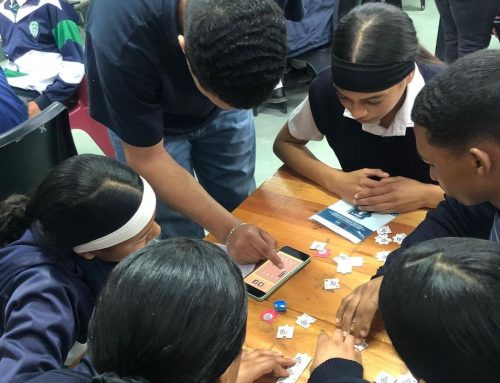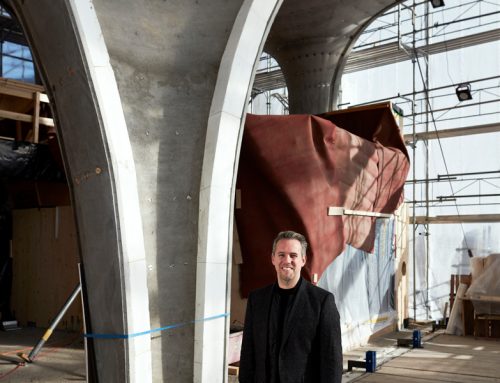
“It feels fantastic to have an inner city and a place that you can go to with an ease that has not been here for many years,” says Wits alumnus William Kentridge whose studio is in the Maboneng precinct on the east side of Joburg’s inner city.
In this, the second feature in our series on Joburg, we explore Maboneng, Sotho for Place of Light.
When your shirt-maker is situated in the same neighbourhood as your business, then you know you’re at home. Such is the case for William Kentridge whose studio is in the Arts on Main building in Maboneng or Jeppe as it was once called.
His shirt-maker, Elizabeth Kading of five8ths has a shop on Maverick Corner in Maboneng. Her ethos speaks of the culture of Mabonengers – an inner city tribe devoted to re-imagining discarded spaces to make way for, as Kading puts it, “a more stylish, less wasteful world”.
The money follows
It’s well known that artists and creatives the world over are the pioneers of inner city regeneration. They move into abandoned industrial buildings for the size and price, and the money follows. Which is precisely what has happened in Maboneng where Kentridge moved five years ago.
“I needed a larger, more industrial studio and found it in a warehouse in Jeppe, that is now part of Arts on Main, but I certainly did not buy it as an investment in Maboneng,” he says. “I’m not a property developer; I don’t invest in property in the inner or outer city.”
He’s not, but when giant names like Kentridge move into a development, alongside the David Krut Print Workshop (DKW) and gallery, others take note and do the same. This certainly played a role in the rise and shine of Arts on Main, which was restored, redeveloped and launched in 2009 by property developer, Jonathan Liebmann.
The Man Behind Maboneng
At the age of 31 he is widely renowned as The Man Behind Maboneng. His property development company Propertuity’s goal is “to use art, design, architecture and cultural activations to set in motion the transformation of degenerated areas into thriving neighbourhood destinations”.
Since 2009, Propertuity has restored and redeveloped 10 buildings in Maboneng and currently owns over 40 buildings, scheduled for the same. They’re all mixed-use developments, with residential, retail, restaurants and entertainment combined, each with a distinct name. There’s Maverick Corner, Revolution House, Main Street Life, Urban Fox, Craftmen’s Ship, Rocket Factory and more.
Liebmann’s rationale for putting finance and energy into Maboneng was triggered in 2008 when he returned from living and working abroad.
Interact with the urban environment
“I became frustrated with Johannesburg in that there was nowhere I felt that I could live or work and have a proper interaction with the urban environment.” This prompted him to convert a property for himself on the fringe of the city.
“That was when I discovered that converting properties was something I was passionate about. I then started looking at places in the Johannesburg CBD where I could develop these kinds of spaces for myself and likeminded individuals.”
Five years later his developments are flying off the shelves, many selling off plan. The prices are not for the modest pocket, ranging from around R350 000 for a small studio space to R3.9million for a furnished penthouse.
Entrepreneurs and urban investment magnates
The price span speaks of the range of owners and tenants – from 20-to-40-something entrepreneurs to urban investment magnates – many of whom are out and about in the streets of Maboneng, riding bicycles, drinking freshly brewed coffee and eating homemade muesli or deli delights at their local – like Uncle Merv’s on the corner of Fox and Kruger Streets or at Origin at Arts on Main.
As Kentridge puts it: “Maboneng is about a number of diverse, mostly small-scale initiatives coming together to change the inner city streets into comfortable places to walk, and into a precinct that is familiar rather than threatening.”
Strolling up Fox Street
Strolling up Fox Street – the spine of Maboneng – on a sunlit Sunday, you straightway feel the urban-suburban mood. Yet just five years ago you would not walk around here with any sense of ease.
Sunday is market day in Maboneng when people flock from the north, south, east and west of Joburg to enjoy the feast of foods, artworks, clothing and collectibles (no Chinese trinkets) at the market in the Arts on Main complex and in the surrounding streets.
Getting here is a bit of a maze, as the route to Maboneng from the highway is not clearly marked, which can be scary for those unaccustomed to the inner city.
Surprised and fascinated
But once you are here, the world of Maboneng opens its arms to you, and you’ll most certainly be surprised and fascinated by its lineup of businesses, coffee shops, restaurants, nightclubs, theatres, cinemas, hotels, backpacker accommodation, art galleries and museums.
It’s an inspiring model of inner city regeneration, and for those who knew Joburg in its heyday and its subsequent decline, it is heart-warming to see Jeppe, which was part of the heartbeat of Joburg since gold was discovered, come to life once more.
Maboneng’s Minister of Tourism
A few blocks up Fox Street is Curiocity Eastcity Backpackers, where our WITSReview team meets up with Maboneng’s Minister of Tourism and co-owner of Curiocity, Bheki Dube.
Offering tours of the inner city and Maboneng, and accommodation in Curiocity’s restored Edwardian industrial building, Dube, 22, was born and raised in nearby Troyeville.
“I grew up amongst artists and rebels of great consciousness with a group of incredible mothers raising us, like my Mom Attah Dube and singer Jennifer Ferguson. They provided an art centre for us when we were young and shaped the way we thought and saw society,” says Dube who studied photojournalism at the Market Photo Workshop.
Joburg has always been my passion
“Joburg has always been my passion and I began exploring the city on my skateboard, taking photos, which is how the idea of starting a tourism company was born.”
In 2011 he and lawyer Greg Solik who was working at the Constitutional Court at the time, got together to create an inner city tourism company called Main Street Walks. “We wanted to reconscientise people about the hidden treasures and workings of the city of Joburg,” explains Dube who took over the business after Solik moved to Cape Town.
Today Dube employs four tour guides and Main Street Walks offers visitors several innovative options: from urban hiking tours to picnics in the sky at the top of the Carlton Centre to adventures in the Mai Mai Traditional Healers Market and the Ethiopian Quarter on Jeppe Street where they have authentic restaurants, souvenir stores and delicious coffee.
Curiocity Eastcity Backpackers
Taking the next step in his business, Dube wanted to open a backpacker destination in Maboneng, as he wanted people to stay in the inner city, not just take the tours and leave. He approached Jonathan Liebmann with the idea, and in 2013 Curiocity Backpackers opened for business, which Dube co-owns with Liebmann.
Curiocity’s building has an intriguing history: it was once home to Pacific Press, which printed all sorts of material for the ANC in the 1950s, and was well known to prominent ANC members, including Nelson Mandela, Joe Slovo and Desmond Tutu.
Room rates range from R160 for the dormitories to R360 for the standard double rooms. Meals are available at the in-house restaurant Sha’p Braai where good old South African fare is served – pap & vleis, chicken & salad and boerie rolls. Residents can also eat at any one of the 18 restaurants in Maboneng – from delis to sushi bars to Ethiopian and Israeli restaurants.
From the gold rush to apartheid
Other accommodation offerings in Maboneng include the 12 Decades Hotel in Fox Street where each room represents a different decade of Joburg’s history – from the gold rush to apartheid to democracy and freedom. Rates here are R870 per night.
Both Curiocity and 12 Decades have been hosting plenty of European travellers and the domestic market is growing. “Once you convince a local tourist to come on an inner city tour and befriend the city, they bring other people here and so the network grows,” says Dube. Shuttle services are offered to all visitors.
To reunite young people with the inner city they offer the Urban Geography School Tours for learners. “A girl from a private school in the northern suburbs was so taken with the tour, that she brought her parents and grandparents back here, which is exactly what we want to happen,” he adds.
Highlights and lowlights
The WITSReview team is part of this converted niche, as Dube takes us on a magical Maboneng tour, where we take in the highlights and lowlights of inner city regeneration.
Up the road from Curiocity is a burnt-out former Italian Laundromat inhabited by 50 squatters, including families with young children.
As often happens in the process of gentrification, squatters are pushed out of the precinct, but the Mabonengers are hoping to adopt a different approach through the Global Regeneration Initiative for Neighbourhood Development (GRIND).
“The idea is to convert the burnt-out building into a more formal structure with water and electricity, with the tenants paying a minimal rent,” Dube explains. The oldest resident, a traditional healer named Manana who has lived here for 40 years, says they would welcome the change.
Bree Street Belle
From this sobering reality we head for Smack! Republic – Joburg’s first inner city microbrewery in the Arts on Main complex – for a bottle of Bree Street Belle. It was voted the best beer by a new brewery in South Africa, in the 2013/14 SAB Craft Brewers Championship.
Bree Street Belle in hand we explore the local art galleries where Wits alumni feature prominently. At Rubixcube we meet curator Michael Kaplan who studied music at Wits. He co-curates this gallery space with Wits alum and artist Frederick Clarke.
Museum of African Design (MOAD)
From here we head up the road to MOAD or the Museum Of African Design in Commissioner Street where Wits lecturer Niall Bingham’s exhibition Mirror Images is open to all, at no charge.
MOAD’s philosophy is to celebrate South African and African design – from fashion to fine art – to put Africa on the highest level globally in terms of its creative prowess, and at the same time to use the space for functions and fun nights – from cocktail parties to roller discos.
An open-air art gallery
The entire Maboneng precinct is an open-air art gallery where a number of South African and international artists have contributed to its design, aesthetic and identity, with over 30 public artworks, including building-scale murals.
One of the murals features Jan van Riebeeck wearing an African print shirt; another is a 40metre tall (10-storey) black and white mural of Madiba boxing; both are by Ricky Lee Gordon (aka Freddy Sam).
The text of the mural reads: I AM BECAUSE WE ARE. “Nelson Mandela taught us that we cannot be human by ourselves. This is a constant theme in all my work,” Gordon explains. Other artists featured in Maboneng’s public artworks include Wits Fine Arts alumnus Stephen Hobbs, Faith 47, Dal East and Hannelie Coetzee.
R3.9million penthouse
Heading back down Fox Street we stop in at The Townhouse, a fourth floor penthouse on Fox Street that’s on show. An estate agent hands us a luxurious, full-colour portfolio of the property, which comes with a close on R3.9million price tag, décor included.
It claims “a panoramic view over the city, best enjoyed from the wraparound deck that surrounds the 282sq metre home”. The more cynical would call it more of a rooftop view, some of the roofs being rather rusty, but it personifies the urban-industrial-slick that Mabonengers and would-be Mabonengers prefer.
Joyous, peaceful atmosphere
By the time we complete our tour, Maboneng is teaming; there are thousands of people here, all contributing to the joyous, peaceful atmosphere. The whole precinct is also well guarded, with helpful security guards visible everywhere.
“Sundays are definitely the best days to visit, but for all of us who live, play and work in Maboneng we enjoy being here throughout the week,” says Dube who says they feel safe here because they have claimed back the streets.
This is seconded by the Maboneng Precinct’s Brand Manager, Hayleigh Evans, who is also the owner/manager and performer at the POPArt Theatre – an 80-seater theatre in the Main Street Life building in Maboneng – who explains that she frequently walks home alone late at night.
Comfortable as a single woman
“I don’t think I would feel as comfortable as a single woman anywhere else,” she says. “Once you have been exposed to the urban lifestyle of Maboneng you’re not going to move out. Most of my friends live here now, some with children or mabobabas who will attend the primary school we’re developing here, along with a park.”
It’s seems there’s no stopping the Mabonengers and the “mass expansion” that Propertuity is planning for the precinct, as Liebmann puts it. From here he’s setting his sights on other cities in South Africa and Africa. And while he colonises the continent, Sir Stan will continue to teach people how to box and handle themselves on the streets of Jozi, just as he always has.
Sir Stan’s Athletic Club
Sir Stan or Stan Ndlovu established Sir Stan’s Athletic Club in 1978 as a professional boxing and fitness gym on the corner of Fox and Kruger Streets. Apart from boxing lessons he offers one-on-one training, group cross-fit workouts and boot camp training. At between R300 and R500 per month, Sir Stan’s is another hidden gem of old Jeppe brought back to life.
Simply said, Maboneng is exactly what Joburg needs, and everyone should visit. As 16-year-old Jesse Sterling, who experienced Maboneng for the first time, puts it: “I love the vibe, the liveliness, it’s so energetic. If I was to draw it, I’d draw a zigzag.”




